2001 Ford Focus, a name that evokes memories of a time when compact cars were making their mark on the automotive landscape. This model, introduced in 1999, quickly became a favorite among drivers seeking a blend of affordability, practicality, and decent performance.
The 2001 Ford Focus, in particular, stands out as a pivotal moment in the model’s evolution, offering a refined driving experience and a host of features that made it a compelling choice for a wide range of buyers.
This article delves into the world of the 2001 Ford Focus, exploring its design, features, performance, reliability, and the impact it made on the automotive industry. We’ll uncover what made this compact car so popular and why it continues to hold a special place in the hearts of many car enthusiasts.
Overview
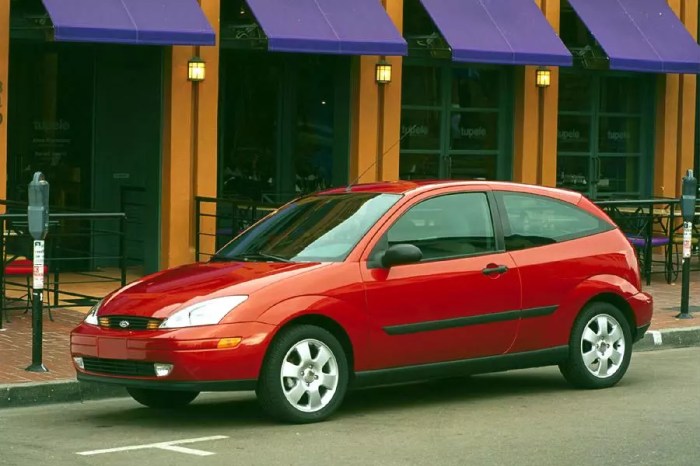
The 2001 Ford Focus marked a significant shift in the compact car segment, introducing a stylish and practical design that resonated with a wide audience. It was a key player in Ford’s efforts to revitalize its image and compete effectively in the increasingly competitive global market.
The 2001 Ford Focus was launched in the United States in late 1999 as a 2000 model year vehicle. Production continued until 2007, with significant updates and revisions introduced along the way. The Focus was available in a variety of body styles, including a sedan, hatchback, and wagon, catering to diverse needs and preferences.
Target Audience
The 2001 Ford Focus targeted a broad range of buyers, including young adults, families, and budget-conscious individuals seeking a reliable and fuel-efficient vehicle. Its compact size and maneuverability made it well-suited for urban environments, while its versatility and practicality appealed to families and those seeking a vehicle for everyday use.
Design and Features
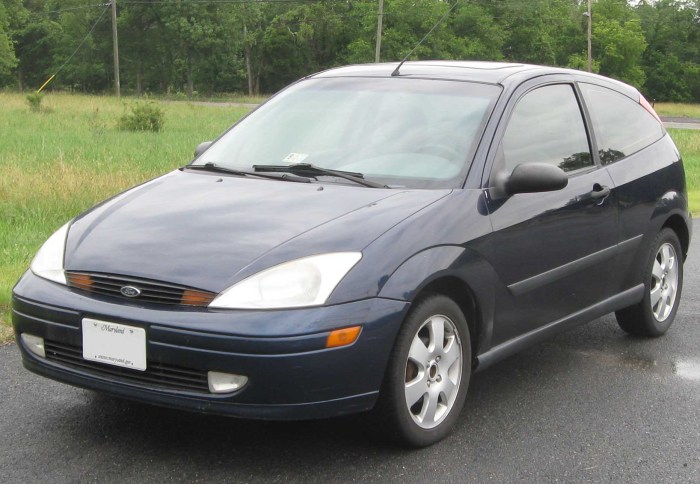
The 2001 Ford Focus, a compact car designed for affordability and practicality, introduced a fresh design language and a range of features that appealed to a wide audience. Its distinctive styling, spacious interior, and versatile options made it a popular choice for commuters, families, and young drivers.
Exterior Design
The 2001 Ford Focus featured a contemporary and aerodynamic design that was a departure from the traditional boxy shapes of previous compact cars. The Focus’s exterior design elements included:
- A rounded, sculpted body with a low-slung profile.
- A large, prominent grille with a distinctive Ford logo.
- Sleek, wraparound headlights and taillights.
- Available options such as alloy wheels, body-colored bumpers, and rear spoilers.
The Focus was available in various body styles, including a three-door hatchback, a five-door hatchback, and a four-door sedan. Its dimensions were compact and practical, offering ample space for passengers and cargo.
Interior Design
The interior of the 2001 Ford Focus prioritized functionality and comfort. The cabin was designed to be spacious and inviting, with features such as:
- A user-friendly dashboard layout with easy-to-read gauges and controls.
- Comfortable seating for five passengers, with adjustable front seats and ample legroom.
- A variety of interior trim options, including cloth, vinyl, and leather.
- Available features such as air conditioning, power windows, and power locks.
While the interior materials were generally basic, they were durable and well-constructed. The Focus offered a practical and comfortable driving experience.
The 2001 Ford Focus, a compact car known for its practicality and affordability, represented a departure from the classic American styling of earlier decades. In contrast, the 1951 Ford Custom Deluxe embodied the era’s love for chrome accents and flowing lines, showcasing a distinct sense of elegance and luxury.
While the Focus offered modern efficiency, the Custom Deluxe was a symbol of a bygone era, reflecting the changing tastes and priorities in automotive design over time.
Features and Technologies
The 2001 Ford Focus offered a range of features and technologies, catering to different needs and preferences. Key features included:
- Engine Options:The Focus was available with a variety of engine options, including a 1.8L four-cylinder engine, a 2.0L four-cylinder engine, and a 2.0L Duratec engine, offering different levels of power and fuel efficiency.
- Transmission Types:The Focus was available with a five-speed manual transmission or a four-speed automatic transmission, allowing drivers to choose their preferred driving style.
- Safety Systems:The 2001 Ford Focus included standard safety features such as dual front airbags, anti-lock brakes (ABS), and a driver’s side side impact airbag. Available options included side curtain airbags and a traction control system.
These features combined to create a well-rounded compact car that was both practical and enjoyable to drive.
Performance and Handling
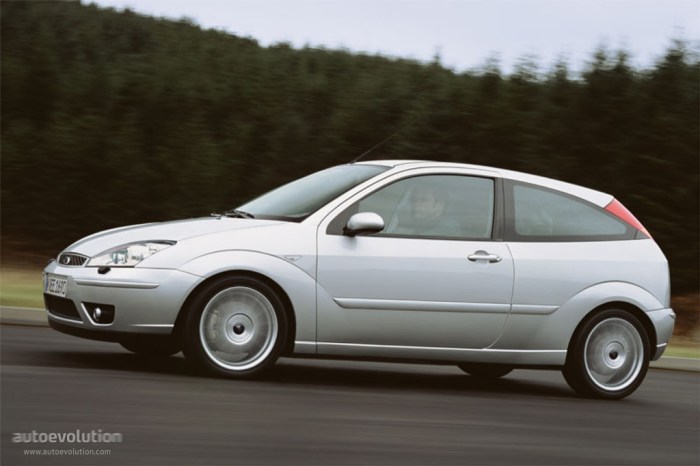
The 2001 Ford Focus was a popular compact car known for its fuel efficiency and maneuverability. It offered a range of engine options, each with its own set of performance characteristics.
Engine Specifications
The 2001 Ford Focus came with a variety of engine options, offering a blend of power and fuel economy. Here’s a breakdown of the key engine specifications:
- 1.8L Zetec engine:This base engine produced 110 horsepower and 115 lb-ft of torque. It was known for its fuel efficiency, achieving an EPA-estimated 27 mpg city and 34 mpg highway.
- 2.0L Zetec engine:This larger engine generated 125 horsepower and 130 lb-ft of torque, offering a more spirited driving experience. It delivered an EPA-estimated 24 mpg city and 31 mpg highway.
- 2.0L Duratec engine:This engine was only available on the SVT Focus and produced 170 horsepower and 145 lb-ft of torque. It offered impressive acceleration and handling, making it the sportiest option in the Focus lineup.
Performance Comparison to Competitors
The 2001 Ford Focus held its own against its competitors in terms of performance. Its acceleration was comparable to other compact cars of the time, and its handling was praised for its responsiveness and agility.
- Acceleration:The 2001 Ford Focus with the 2.0L Zetec engine could reach 60 mph in about 9 seconds. This was similar to the acceleration times of other compact cars like the Honda Civic and Toyota Corolla.
- Braking:The Focus’s brakes provided adequate stopping power, offering a safe and predictable braking experience. It was generally on par with its competitors in terms of braking distance.
- Handling:The 2001 Ford Focus was known for its nimble handling, thanks to its well-tuned suspension and responsive steering. It was praised for its ability to navigate corners with precision and confidence.
Driving Experience
The 2001 Ford Focus offered a pleasant driving experience, characterized by its comfortable ride, responsive steering, and overall handling prowess.
- Ride Quality:The Focus’s suspension provided a comfortable ride, absorbing bumps and irregularities in the road effectively. It was generally considered to be a smooth-riding car for its class.
- Steering Feel:The Focus’s steering was precise and well-weighted, providing good feedback to the driver. It allowed for confident maneuvering and precise handling, making it enjoyable to drive on winding roads.
- Overall Handling:The 2001 Ford Focus was known for its agile and responsive handling. It was easy to maneuver in tight spaces and felt confident on the open road. Its well-balanced chassis and precise steering made it a joy to drive.
Reliability and Maintenance: 2001 Ford Focus
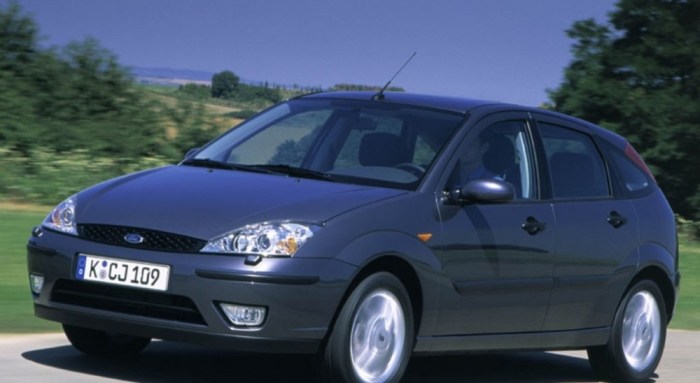
The 2001 Ford Focus, while generally considered a reliable car, has its share of common issues that owners should be aware of. Understanding these potential problems and implementing preventative maintenance can help extend the life of your Focus and minimize unexpected repairs.
Common Issues and Reported Problems
Common issues reported by 2001 Ford Focus owners include:
- Engine Problems:The 2.0L Zetec engine, common in the 2001 Focus, is known for its reliability, but it can experience issues with the timing belt, which should be replaced every 60,000 miles to prevent catastrophic engine damage. Additionally, issues with the engine cooling system, such as leaks or a faulty thermostat, can lead to overheating.
- Transmission Problems:The 2001 Focus is equipped with either a manual or automatic transmission. The automatic transmission, particularly the 4-speed unit, can exhibit problems with shifting, slipping, or rough engagement. This can be due to worn-out clutch packs, solenoids, or other internal components.
Regular fluid changes and maintenance can help prevent these issues.
- Suspension Problems:The 2001 Focus’s suspension is known for its handling, but it can suffer from premature wear and tear on components like struts, shocks, and ball joints. This can result in noisy rides, poor handling, and uneven tire wear. Regular inspections and replacements as needed are crucial.
- Electrical Problems:Electrical issues, such as faulty wiring, sensors, or control modules, can affect various systems in the car, including the lights, gauges, and engine performance. These issues can be difficult to diagnose and repair, often requiring specialized tools and knowledge.
- Rust:The 2001 Ford Focus, particularly those residing in areas with harsh weather conditions, is prone to rust formation. This can occur on the body panels, undercarriage, and even the exhaust system. Regular inspections and prompt attention to any signs of rust can help prevent further damage.
Maintenance Schedule and Recommended Service Intervals
Maintaining your 2001 Ford Focus according to the manufacturer’s recommended schedule is essential for its longevity and performance. Here’s a general overview of the recommended service intervals:
- Oil Change:Every 3,000 miles or 3 months, whichever comes first.
- Air Filter Replacement:Every 12,000 miles or 12 months.
- Spark Plug Replacement:Every 30,000 miles or 30 months.
- Timing Belt Replacement:Every 60,000 miles or 60 months.
- Transmission Fluid Flush:Every 30,000 miles or 30 months for automatic transmissions.
- Brake Fluid Flush:Every 2 years or 24 months.
- Coolant Flush:Every 3 years or 36 months.
- Tire Rotation:Every 5,000 miles or 5 months.
It’s important to note that these are just general guidelines. Refer to your owner’s manual for the specific maintenance schedule and service intervals for your 2001 Ford Focus. Additionally, consider the driving conditions and your individual usage habits when determining the appropriate maintenance schedule.
Tips for Maintaining the 2001 Ford Focus
To ensure your 2001 Ford Focus remains in good condition and provides reliable service, follow these maintenance tips:
- Regular Oil Changes:Using the correct type and weight of motor oil is crucial for engine lubrication and performance. Changing the oil regularly prevents sludge buildup and engine wear.
- Air Filter Replacement:A clean air filter allows for proper airflow to the engine, improving fuel efficiency and performance. A clogged air filter can restrict airflow, leading to reduced power and increased fuel consumption.
- Timing Belt Replacement:The timing belt is essential for synchronizing the engine’s valves and pistons. A broken timing belt can cause catastrophic engine damage. Replacing it at the recommended interval prevents this costly repair.
- Fluid Checks and Replacements:Regularly check and replace fluids such as transmission fluid, brake fluid, coolant, and power steering fluid. Low fluid levels or contaminated fluids can lead to system failure and costly repairs.
- Regular Inspections:Regularly inspect your car for any signs of wear and tear, including tire tread depth, brake pad thickness, suspension components, and body panels. Addressing these issues promptly can prevent more significant problems later.
- Use Quality Parts:When performing repairs or replacements, use high-quality parts from reputable manufacturers. Using cheap or counterfeit parts can compromise the quality and longevity of the repair.
- Proper Storage:If you’re not using your 2001 Ford Focus regularly, store it in a dry, well-ventilated area to prevent rust and corrosion. Consider using a car cover to protect the paint from dust and UV damage.
Ownership Experience

The 2001 Ford Focus offers a unique ownership experience, characterized by its affordability, practicality, and a blend of pros and cons that are important to consider. This section will delve into the experiences of Focus owners, analyzing their feedback to provide a comprehensive understanding of what it’s like to own this popular compact car.
Strengths and Weaknesses
Owner reviews and feedback provide valuable insights into the strengths and weaknesses of the 2001 Ford Focus. This table summarizes the key aspects highlighted by Focus owners:
| Strengths | Weaknesses |
|---|---|
| Reliable and durable engine | Susceptible to rust, particularly in areas with harsh weather conditions |
| Affordable to purchase and maintain | Interior materials may feel cheap and lackluster compared to competitors |
| Spacious and practical interior for its size | Limited cargo space, especially with rear seats folded down |
| Good fuel economy | Some reported issues with electrical components and sensors |
| Fun and engaging driving experience | Ride quality can be harsh on rough roads |
Ownership Stories and Anecdotes
Real-life experiences provide a more personal understanding of the 2001 Ford Focus ownership journey. Here are some stories shared by Focus owners:
“I bought my 2001 Focus used for a steal, and it’s been a great car for me. It’s reliable, gets good gas mileage, and is surprisingly fun to drive. I’ve had to replace a few things over the years, but nothing major. I’m planning on keeping it for a long time.”
John, Focus owner for 10 years
“My Focus has been a real workhorse for me. I’ve used it for everything from daily commutes to road trips, and it’s never let me down. It’s a bit rough around the edges, but it’s incredibly practical and affordable. I wouldn’t hesitate to recommend it to anyone looking for a reliable and economical car.”
Sarah, Focus owner for 7 years
“I’ve had some issues with rust on my Focus, especially on the undercarriage. It’s a known problem with this model, and I’ve had to spend some money on repairs. Other than that, it’s been a decent car, but I’m not sure I’d buy another one because of the rust issue.”
Michael, Focus owner for 5 years
The 2001 Ford Focus was a popular compact car known for its affordability and fuel efficiency. While the Focus offered practicality for daily commutes, if you needed a rugged truck for hauling and towing, the 1988 Ford F150 was a solid choice.
The F150’s durability and powerful engine made it a reliable workhorse, while the Focus remained a favorite for city driving and errands.
Resale Value and Long-Term Ownership
The resale value of the 2001 Ford Focus is generally considered to be average. However, well-maintained examples with low mileage can still fetch a decent price in the used car market. The 2001 Focus is known for its reliability, making it a viable option for long-term ownership.
However, potential buyers should be aware of the common rust issues and factor in the cost of potential repairs. With proper care and maintenance, a 2001 Ford Focus can provide years of reliable service and offer a practical and affordable ownership experience.
Historical Context
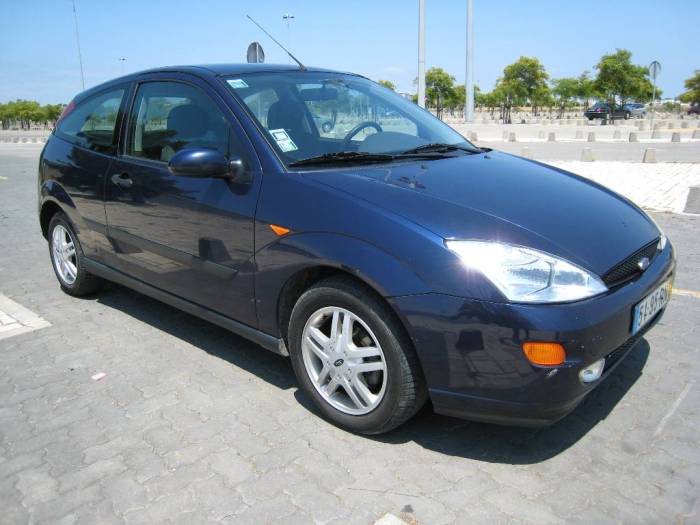
The 2001 Ford Focus marked a significant turning point in the compact car segment, representing a shift towards more modern, stylish, and fuel-efficient vehicles. It was a pivotal model for Ford, contributing to the company’s resurgence in the late 1990s and early 2000s.
Comparison with Predecessors and Successors, 2001 Ford Focus
The 2001 Ford Focus was a radical departure from its predecessor, the Ford Escort. While the Escort was known for its affordability and practicality, the Focus brought a more European-inspired design, featuring a sleek, rounded body and a more refined interior.
This shift reflected the growing demand for cars that offered both functionality and style. The Focus also introduced a new platform, known as the “C1 platform,” which was designed to be lighter and more fuel-efficient than the Escort’s platform.
The 2001 Ford Focus marked a shift in the compact car market, offering a sporty and efficient driving experience. While the Focus was known for its modern design, it’s worth noting that Ford’s history in the compact segment stretches back to the 1971 Ford Escort , a model that helped establish the brand’s reputation for affordability and practicality.
The Focus, in its own way, continued this legacy, offering a blend of performance and value that resonated with drivers looking for a reliable and fun-to-drive compact car.
This platform would later be used for other Ford models, including the Mazda3.The 2001 Focus paved the way for subsequent generations of the model, which continued to evolve and refine its design and features. Later generations of the Focus introduced more advanced technologies, such as electronic stability control and a more powerful engine lineup.
Cultural Impact
The 2001 Ford Focus enjoyed immense popularity, becoming a staple in the compact car segment. It was praised for its handling, fuel efficiency, and affordability. The Focus also became a popular choice for young drivers, thanks to its sporty styling and engaging driving experience.
The Focus’s success helped to revitalize Ford’s image, solidifying its position as a leading manufacturer of compact cars.
Legacy and Impact
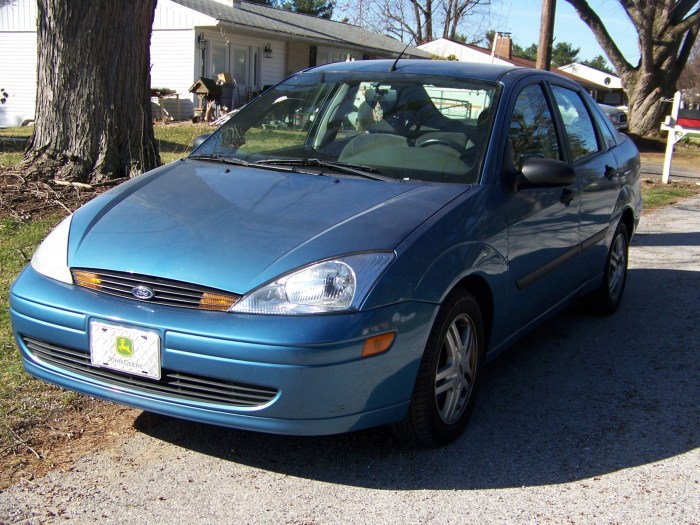
The 2001 Ford Focus left a significant mark on the automotive landscape, influencing both the compact car segment and Ford’s future product strategy. Its introduction marked a turning point for Ford, signaling a shift towards more fuel-efficient and globally competitive vehicles.
Impact on the Compact Car Segment
The 2001 Ford Focus played a pivotal role in redefining the compact car segment. It challenged the notion that compact cars were inherently bland and utilitarian, offering a blend of style, practicality, and driving dynamics that resonated with a wider audience.
Its success spurred a wave of innovation within the segment, leading to the development of more sophisticated and engaging compact cars.
- Increased Focus on Design:The Focus’s distinctive and sporty design, with its sculpted lines and bold grille, helped to elevate the perception of compact cars as stylish and desirable vehicles. This trend continued with subsequent generations of the Focus and influenced other compact car models from various manufacturers.
- Improved Driving Dynamics:The Focus introduced a more engaging driving experience to the compact car segment, with its precise steering, responsive handling, and well-tuned suspension. This focus on driving dynamics set a new benchmark for the segment, prompting other manufacturers to prioritize handling and performance in their compact car offerings.
- Emphasis on Fuel Efficiency:The Focus’s fuel-efficient engines and lightweight construction made it a compelling option for environmentally conscious consumers. Its success contributed to the growing demand for fuel-efficient vehicles, leading to widespread adoption of technologies like variable valve timing and direct injection in compact car models.
Key Innovations and Features
The 2001 Ford Focus introduced several innovative features that became hallmarks of the model and influenced future Ford vehicles.
- Independent Rear Suspension:The Focus was one of the first compact cars to offer an independent rear suspension, contributing to its superior handling and ride quality. This innovation became a standard feature in many subsequent compact car models.
- Zetec Engine:The Focus’s Zetec engine series, known for its smooth operation and power delivery, became a cornerstone of Ford’s engine lineup. These engines were later adapted and refined for use in other Ford models, including the Fiesta and the Fusion.
- Safety Features:The Focus was equipped with advanced safety features, such as dual front airbags, anti-lock brakes, and a driver’s side knee airbag, which were not common in compact cars at the time. These features set a new standard for safety in the segment, influencing other manufacturers to adopt similar safety technologies.
Future of the Ford Focus
While the Ford Focus has faced challenges in recent years, it remains a significant model in Ford’s global lineup. The Focus continues to be a popular choice in Europe and other international markets. The future of the Focus likely involves a continued focus on fuel efficiency, technology integration, and driving dynamics.
- Hybrid and Electric Powertrains:Ford is investing heavily in electrification, and the Focus is likely to offer hybrid and electric powertrain options in the future, catering to the growing demand for sustainable transportation.
- Advanced Driver-Assistance Systems (ADAS):The Focus is expected to feature advanced driver-assistance systems, such as adaptive cruise control, lane departure warning, and automatic emergency braking, enhancing safety and driver convenience.
- Connectivity and Infotainment:The Focus will continue to incorporate advanced connectivity and infotainment features, including smartphone integration, cloud-based navigation, and over-the-air software updates.
Epilogue
The 2001 Ford Focus stands as a testament to the evolution of compact cars, showcasing a blend of practicality, affordability, and driving enjoyment. While the model has since undergone several transformations, the 2001 iteration remains a cherished classic for those who value its timeless design, reliable performance, and enduring legacy.
Whether you’re a nostalgic driver reminiscing about your first car or a car enthusiast seeking a glimpse into the past, the 2001 Ford Focus offers a captivating glimpse into a bygone era of automotive innovation.